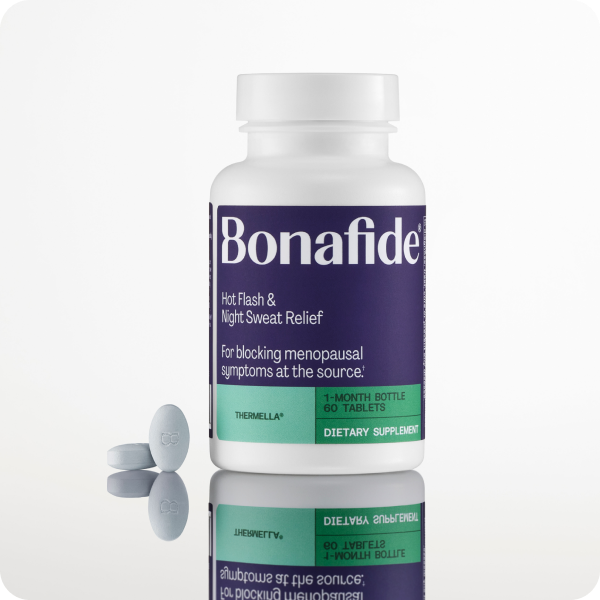Dealing with Hot Flashes
If you are one of the more than 70% of women in menopause experiencing hot flashes day and night, consider yourself in good company. Of the 64 million menopausal women in the U.S., more than 70% suffer from vasomotor symptoms (which, by definition, are menopausal hot flashes and night sweats). These pesky and disruptive symptoms are the result of when the thermoregulatory zone in the brain (the body’s central thermostat) goes rogue. While they can vary in frequency, intensity and duration, hot flashes are no laughing matter. They can disturb your day-to-day quality of life, with recent data from SWAN (Study of Women’s Health Across the Nation) suggesting vasomotor symptoms can last for an average duration of 7.4 years but can continue for a whopping 15 years of “heat,” if you’re one of the lucky few.
Why Am I Experiencing Hot Flashes?
What was your mother’s experience with menopause and hot flashes? I ask because your menopause experience is in part genetic. In addition, African American or Latina women, smokers and those who are overweight, tend to experience more notable hot flashes.
How to Stop Menopause Hot Flashes
For one, seriously consider making some important lifestyle changes if you’re looking for a more natural remedy for hot flashes, without taking hormones. The Mediterranean diet, which is rich in lean protein, fresh fruits, and vegetables, rich in olive oil instead of butter, and is low in simple carbs and salt, is preferred. Eliminate common hot flash triggers: yes ladies, this means minimizing some of our favorites like caffeine, alcohol, larger meals and stress. Regular exercise is a must. Some women tend to find mindfulness beneficial; and yes, there’s an app for that! (Consider Calm or Headspace for 10 minutes of peace to start the day). Acupuncture is another option.
Phytoestrogens for Hot Flashes
Phytoestrogens are plant-based substances chemically similar to estrogen, the hormone that plummets during menopause. Soy based foods, including tofu and tempeh, contain phytoestrogens. Various other phytoestrogens, including black cohosh, red clover and soy-based isoflavones, are all available in supplement form, and are over the counter. Most studies suggest that these are no more helpful reducing hot flashes than placebo, which in itself shows a 30% reduction in hot flashes. Since these plant-based supplements are chemically similar to estrogen, women with a history of breast cancer, current or past, should consider alternatives and speak with their healthcare providers prior to making a treatment decision. Caution is also advised when mixing phytoestrogens and other medications metabolized through the liver.
Can you Stop Menopause Hot Flashes Without HRT?
In fact, Relizen® is just that! This over-the-counter nutritional supplement is the real deal when considering a really, truly hormone-free option for managing hot flashes and managing your day-to-day quality of life, including improved sleep! Made from a proprietary pollen blend extracted from four specific Swedish plants, and likely working through serotonin-like pathways in the brain, Relizen® has been shown in several clinical studies to reduce the frequency and intensity of menopausal hot flashes by more than 70%.1 In fact, results were so notable that a significant number of women in additional survey studies (upwards of 80%) opted to remain on Relizen® for the treatment of their hot flashes voluntarily once the studies were completed.2 Of equal importance, side effects different from placebo were not reported and use in breast cancer patients is not controversial since Relizen® is not a phytoestrogen and does not act like estrogen in the body.
Certain Antidepressants May Help Reduce Hot Flashes
Specific antidepressants in the SSRI /SNRI classes are often recommended for dealing with hot flashes. They are particularly helpful in those women who are also dealing with depression but are indicated for the treatment of vasomotor symptoms as well. While effective and well-studied, sexual side effects, including low libido and orgasm difficulties are unfortunately also common side effects. No thank you! Use with tamoxifen is relatively contraindicated as well.
Prescription Gabapentin for Addressing Hot Flashes at Night
Gabapentin is an epilepsy and nerve pain medication we have borrowed from our neurology colleagues to treat vasomotor symptoms. It is effective for easing menopausal hot flashes during the day and night, but at the same time, it may cause excessive drowsiness – for this reason, Gabapentin is a non-hormonal treatment option for those with hot flashes at night as well as sleep disturbances. This is a prescription medication taken nightly. Traditional sleeping pills do not diminish hot flashes but may help with sleeping through them. Grogginess, headache and vivid intense dreams are all potential side effects.
Why is HRT Considered Controversial?
While traditional HRT using estrogen and progesterone, bioidentical or synthetic, is surely effective for addressing menopausal hot flashes, they come with some baggage. There may be an elevated risk of breast cancer, uterine cancer and cardiovascular disease with use. Similar concerns exist for compounded bio-identical hormone varieties. Always talk with your healthcare provider before considering hormones to determine the best treatment option for you.
Hormones Are Not for Everyone
It seems that the “less is more” approach is all the rage these days when addressing the hot flashes accompanying menopause. Whether you cannot or just will not take hormone therapy, consider discussing these non-hormonal options with your healthcare provider. For those of you who opt for the real deal, truly non-hormonal path, safe and effective choices are certainly available!
For additional strategies to manage nighttime hot flashes, watch our video guide, here.
Resources
- Based on data from: Winther K, et al. Climacteric. 2005;8:162-170., Elia D, Mares P. Genesis. 2008:135:12-15., Hellstrom AC, Muntzing J. Menopause. 2012;19(7):825-829., and Munoz E. VivaCell Biotechnology GmbH. Internal Report. July 2012.
- Survey data. Goldstein SR, Veledar E, Perez Ojalvo S, et al. 2017;24:14:1455.












Comments
Post commentIt’s so good to see there are more safer options for women going through this thing called Menopause and perimenopause. Some female research to help us cool down! I’m 65 with fewer and a shorter duration of hot flashes now tolerable without medication. But believe me it wasn’t always bearable. I was thrown into Menopause having a hysterectomy at the age of 53. The severity, the duration, and the rapid selection of my hot flashes and night sweats and then so so cold, started making me thinking it’s quality of life not quantity of life that’s important to me!
Until I spoke to my doctor about what was going on with me, and she said 6 magical words “I can help you with that”. Only because I had a complete hysterectomy she was able to put me on hormone replacement therapy, but advised I couldn’t be on long, but at that point I needed anything to make it through more life. I did come off after several good years to avoid cancers. I’m so glad to see going forward safe options for women!
Great Job with the research specifically for US! God Bless
Its about time there is more talks on menopause and seeing Ad’s on TV, and it’s a lovely part of life that every women will experience.